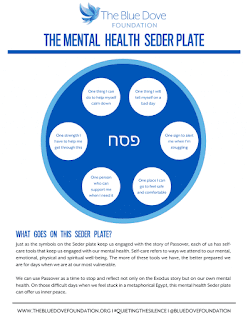Tomorrow night marks the beginning
of Passover. I am certain that most of
us will be keenly aware that this seder
will be the second time we hold our Seders during the Pandemic. Once again many of us are not able to join loved ones in person this year.
The year has taken a very heavy toll on us all. During the pandemic, 4 in 10
adults have reported symptoms of depression and/or anxiety, up from one in ten before the pandemic. There has been an
increase in the number of people reporting difficulty sleeping, focusing,
working, and learning. Consumption of
alcohol and other drugs as well as overeating
has increased. There has been an overall worsening of chronic
medical conditions due to the worry and
stress of the coronavirus and the social isolation as a result of it.
Therefore, I was intrigued when I
came across “The Mental Health Seder Plate”, an interpretation of the Seder
plate put out by the Blue Dove Foundation. The Blue Dove Foundation, based in
Atlanta, was created three years ago to help address the problems of mental
illness and addiction in the Jewish community and beyond.
For example, the Zeroah, or
shankbone on our seder plate, has traditionally represented the “outstretched
arm” through which G-d brought us out of Egypt. But it can be a reminder as
well that at different times in our lives we are all in need of “an outstretched
arm”. We need to remember that it is OK to accept help when it is offered to
us. When we are in a better place, we can then extend our own arms to help
others.
The egg on our seder plate
traditionally represents one of the sacrifices made in the Temple on Passover
during ancient times. They
highlighted an interesting thing
about the egg. The longer it is cooked, the harder it
gets! So too, we need not be weakened by the flames of adversity. We too can be
resilient. In our struggle to overcome, we can become even stronger.
The karpas, or parsley, represents
the Spring and birth and growth. However, we dip the parsley in salt water, the
symbol of tears. For us, it is a reminder that birth and growth are often
accompanied by struggle and pain. Giving birth certainly involves pain – and raising a family involves pain as
well. In fact, the traditional term in
Yiddish for raising children is “Tsaar Gidul Banim” – literally, “the sorrow of
raising children.” In order to experience the joys of parenthood, of seeing our
children grow, we must inevitably endure the sorrows as well.
We eat the bitter herbs to remind
us of the bitterness of slavery. This teaches us the importance of remembering
the bitter times in our lives, as well as the sweet. We should not simply
forget our personal struggles. Rather, there is a time and place to look at
them directly and remember them. We have much to learn from the hardships and
misfortunes in life.
The Charoset, of course, represents
the bricks and mortar that our ancestors used when they were slaves in Egypt.
It is also sweet to the taste. From a mental health point of view, the Charoset
represents the hard work that goes into building a productive life; the
sweetness the freedom that we can achieve from that very work. It is a reminder
that when we feel hemmed in by our life circumstances we can be active
participants in our own lives and work
change the things in our life that we do not like.
Despite our society becoming more
enlightened and compassionate about mental health issues, there is still much
we need to do. We often act as if anxiety, depression, addiction and other
reactions to the stresses of life are some kind of peculiar afflictions that
can be addressed by toughing it out, straightening ourselves up, putting our
mind to it, and hiding it from others. Let our seder plate be a reminder to us
that there is no shame in reaching out and getting help. That we can be strong
in the broken places. That growth often involves pain, but it can lead us out
of the narrow places we find ourselves, out of our own personal Egypt, and into
freedom.
Shabbat Shalom




No comments:
Post a Comment